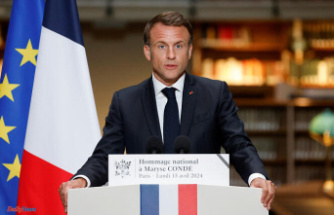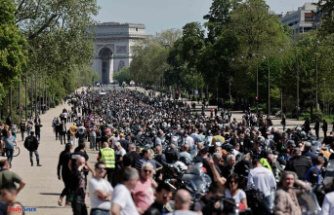Chancellor Olaf Scholz travels to Beijing, China wants to participate in the port of Hamburg. With "Anne Will", the ARD discussion group bickers about dependence on the People's Republic - everyone knows what an enormous danger is already lurking.
After Russia's attack on Ukraine, Olaf Scholz spoke of a turning point. Now the chancellor is flying to China with a high-ranking business delegation, just like in the best of times for her predecessor Angela Merkel. A wrong sign at the wrong time in the wrong place? Means Scholz' trip to Germany's most important trading partner shortly after the Communist Party convention - at a moment when Beijing is governing in an increasingly nationalistic and totalitarian manner, Taiwan has threatened attack more openly than ever and the grave human rights abuses against the Muslim Uyghur minority in western China Xinjiang Province - just "keep it up" or is the necessary change in the German government's China policy coming?
The panel discussion on the People's Republic on Sunday evening on the ARD talk show "Anne Will" is quite contentious. Norbert Röttgen is the first to go. The Scholz short trip was not a diplomatic success because it was "good, but not surprising", according to the CDU foreign politician, that China's head of state and party leader Xi Jinping directed critical words towards Russia regarding threats of using nuclear weapons. Rather, the chancellor had caused "further foreign policy damage." He simply put a "solo trip" on the floor that sent a signal of "business as usual" and "we're doing business with China again".
Of course, the representatives of the traffic light coalition see things differently. Peter Tschentscher explains that "the trip served to address critical issues". The SPD mayor of Hamburg is of the opinion: "In these times we need messages and someone has to deposit the messages." In fact, unlike Merkel in the past, Scholz addressed the human rights situation and warned of an attack on Taiwan. Omid Nouripour, co-chairman of the Greens, also thinks it's right that Scholz drove, because "it's always good when heads of government talk and reduce tensions".
Melanie Amann is "positively surprised" by China's criticism of Russia. But the head of the capital city office of the magazine "Spiegel" sharply attacks Scholz because the chancellor "does not yet know how he wants to deal with China and how he wants to get out of economic dependency". Scholz flew to Beijing "in a situation of uncertainty" and "let himself be instrumentalised by the propaganda". The timing was "very unfortunate", complains Amann.
The Chancellor's scolding brings the real issue of Germany's dangerous dependency on China to the table - and of course makes CDU man Röttgen happy. The federal government paints a "picture of disunity" and Germany has "made itself open to blackmail" with the trip. In general, in the event of a Beijing attack on Taiwan and the possible subsequent collapse of the China business, the CDU man has evil suspicions: "With the dependence that we have entered into, China has a devastating potential for retaliation against us." Green politician Nouripour doesn't let it sit like that and exclaims: "It all grew during the Merkel years." Röttgen retorted that China would only achieve something "if we agree, but not even the coalition agrees, let alone the government with its European partners."
After all, when it comes to the danger of dependency, everyone in the panel discussion agrees. China has been Germany's most important trading partner since 2016, and imports and exports have been increasing rapidly for years. But the German economy is considered to be far more dependent on China than vice versa. You have to "send a clear signal that these dependencies are dangerous," says Stormy-Annika Mildner, and that's why Scholz should have put his delegation together differently on the trip. The foreign trade policy expert from the Aspen Institute Germany, who sees China on the way from autocracy to dictatorship, cites semiconductors and so-called rare earths as the main dependencies. Beijing has a virtual monopoly on the latter metals, which are indispensable for smartphone batteries, solar modules (about 95 percent of solar cells in Germany come from China) and electric cars.
Germany is "in a quandary," says Mildner: The risks of China trade are becoming more and more apparent, but on the other hand our economy is in low flight and the question is how much diversification Germany can afford. "It's like when you're already in an accident on a slippery road and then have to turn around again," the expert describes it as vividly as it is threatening. Journalist Amann then again criticized the ability of the man behind the wheel to drive, because Scholz had "no clear strategy" and "no plan as to when and how far he wanted to get out of which dependencies".
The dependency on China and Scholz' role has also been criticized these days on the subject of the planned Chinese participation in a Hamburg port terminal. And again the argument flares up in the group. "The Port of Hamburg is part of a global power strategy," Röttgen rumbles, "and an important building block in China's global network of dependencies." Tschentscher, almost personally attacked, defends "his" port, whose operation will nevertheless remain "100 percent with the city of Hamburg and the terminal company". The process is normal, China is buying "zero influence on critical infrastructure" and you cannot "disconnect an important national port from what everyone else is doing in Europe," said the mayor.
But that's exactly the problem, criticizes Röttgen. China threatened that "without the deal it would no longer handle traffic via Hamburg" and the Hanseatic city caved in. In the event of a conflict, the Chinese would come back and apply pressure. Amann from "Spiegel" sees it that way too. China is pursuing a strategy of maritime, global dominance and with the participation "a giant would now have a toe in the door". With a view to China's "Silk Road" project of the century, she warns: "In ten years he will have a foot in the door."
Does Scholz, who supports the port deal and traveled to China, show that nothing will change in Germany's China policy? The discussion round with talk show host Anne Will does not come to any conclusion. You will also look in vain for concrete suggestions on how dependencies could be minimized, how human rights in production and intermediate products in complex supply chains, fair competitive conditions and China's recognition of international law in relation to Taiwan could be respected. The federal government does not intend to present a China strategy, which is currently being drawn up, until next year. Why this is happening so late is certainly open to criticism.
It is also objectionable, and here Wildner makes one last important point, that it is not only politics that does not give a good picture of dependency. "The economy" also needs to be attacked, says the foreign trade policy expert. "And we consumers wanted these products too." Key German industries, especially the automotive and chemical industries, are not only more closely linked to China than any other, but are also active in Xinjiang in the form of BASF and Volkswagen, where Beijing commits crimes against humanity.
It remains to be seen whether Scholz's turning point will reach China policy. It has not arrived at companies like BASF. The chemical company only opened a new mega production plant in the People's Republic in September - for ten billion euros, the largest investment in the history of any German company in the country.












